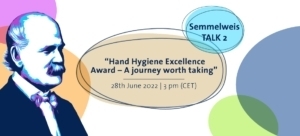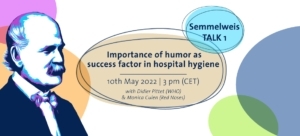The Swiss expert Prof. Dr. Didier Pittet stressed the substantial meaning of hand hygiene in hospitals once again at the third CEE Conference on Hospital Hygiene and Patient Safety.
Not paying attention to the field of hospital hygiene can lead to disastrous impacts. Prof. Dr. Didier Pittet, Director of the Infection Control Programme and WHO Global Patient Safety Challenge “Clean Care is Safer Care” emphasized that four million patients keep dying of nosocomial infections each year in Europe alone. This number needs to be radically decreased. According to the expert, interdisciplinarity plays a major role in that regard. To illustrate that more vividly, he chose the metaphor of silo busting. Apportioned to the daily routines in hospitals it pictures the tendency to deal with matters of its own department only – instead of collaborating with others to work on a joint solution and to achieve common goals. In hospital hygiene in particular, tunnel vision is severe and can lead to wide-reaching consequences.
Busting the Silo
In order to bust silos in hospitals, one needs to accept the fact that there is a hygiene problem in the first place. Although enough data is available to validate the facts, oftentimes there is lack of motivation and communication from heads of departments. “Hand hygiene is the first step to prevent therapy-associated infections and the spread of antibiotic-resistance”, says Pittet. This practice has not reached the desirable level in hospitals and healthcare institutions yet – nonetheless, the status-quo has improved through the engagement of the WHO. Hand hygiene with alcoholic disinfectants by doctors and nursing staff can contribute significantly for hospital infections not to spread.
Keep it rolling
In order to change gridlocked structures, one needs courage. Didier Pittet is certain about that. This was also Dr. Ignaz Semmelweis’ greatest asset who challenged his colleagues’ views with his evidence-based medicine at the time. His studies proved that connected hand disinfection of doctors was linked to the mortality of mothers, which resulted in turmoil and denial. His theories turned out to be correct and led to the reduction of mother’s mortality. “This is why we should not give up”, Pittet emphasizes. 20,000 healthcare institutions in over 180 countries are partners of his WHO campaign and make a contribution for Semmelweis’ message not to be forgotten.




